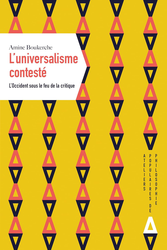March 6, 2024
Thesaurus : Doctrine

► Référence complète : A. Boukerche, L'universalisme contesté. L'Occident sous le feu de la critique, Apogée, 2024, 94 p.
____
____
📗lire la table des matières de l'ouvrage
____
► Résumé de l'ouvrage (fait par l'éditeur) : "L'Occident n'a jamais paru aussi vulnérable à la critique. On lui impute notamment l'humiliation infligée par des siècles de colonisation. Même en son propre sein il est contesté, accusé d'avoir assuré au mâle hétérosexuel blanc des privilèges indus ou encore jugé responsable du saccage de la planète. Pourtant, l'Occident continue de fasciner ceux-là mêmes qui le contestent. Le sens des flux migratoires en est la preuve : ce ne sont pas les Occidentaux qui fuient leurs pays au risque de leur vie, même quand ils sont en désaccord avec leurs gouvernants. Ces quatre derniers siècles, l'Occident a toujours été à la pointe, en politique, morale, esthétique, science, technologie, philosophie, etc. Les bienfaits planétaires de ses progrès justifient, à ses yeux, son universalisme messianique. Cependant, la liste est longue de ceux qui refusent de suivre aveuglément les valeurs "universelles" de l'Occident. Mais que lui reprochent-ils précisément ?".
____
► lire le commentaire de cet ouvrage par 🕴️Christian Ruby, 📝Les critiques de l'universalisme, Nonfiction, 5 avril 2024
________

Updated: Sept. 8, 2018 (Initial publication: April 30, 2018)
Publications

► This working document was intended to serve as a support for a conference pronounced in French in the conference Droit et Ethique ( Law & Ethics) of May 31, 2018 in a symposium organized by the Court of Cassation and the Association Française de Philosophie du Droit. French Association of Philosophy of Law on the general theme Law & Ethics.
See a general presentation of this conference.
Rather, it has served as a support for the article to be published in the Archives de Philosophie du Droit (APD). This article is written in French.
► Summary: It is through the Law that the human being has acquired a unity in the West (I). What religion could have done, the Law also did by posing on each human being the indetachable notion of him of "person" (I.A). But this is what is challenged today, not the personality and the power that the human being has to express his freedom but the unity that implies in the disposition that we have of ourselves in repelling the desire that others have always had to dispose of us. Current law tends to "pulverize" human beings into data and transform into neutral legal services what was considered before as the devouring of others. The legal concept of "consent", ceasing to be proof of a free will but becoming an autonomous concept, would suffice (I.B.).
To prevent the reigning of the "law of desires", which merely reflects the adjustment of forces, we must demand here and now the ethical sovereignty of Law, because Law can not be just just be just the interests adjustment (II). We can form this request if we do not want to live in an a-moral universe (II.A), if we see that the unity of the person is the legal invention that protects the weak human being (II.B.). If we admit this imperative, then we must finally ask who in the legal system will express and impose it, especially the legislator or the judge, because we seem to have lost the ability to recall this principle of the Person on which the West was so centered. But the principles that are no longer said disappear. There would then remain only the case-by-case adjustment of interests between human beings in the world field of particular forces. At this yardstick, Law would be more than a technique of securisation of particular adjustments. Law would be reduced at that and would have lost its link with Ethics. (II.C).
Feb. 25, 2014
Conferences

Le droit est un système qui ne fonctionne bien qu’à base de qualifications, de définitions et de catégories fondamentales. Or, il semble que l’on s’achemine vers une accumulation de dispositions pointilleuses et disparates pour réagir au coup par coup à propos de tels ou tels type de robots. Si l’on reprend une vision plus globale et plus classique, l’on doit constater que les robots à la fois remettent en question la summa divisio entre "personne" et "choses", sur laquelle tout le droit occidental s’est construit, et qu’il paraît difficile de s’en passer. Pragmatiquement, l’on ne doit pas écarter la confrontation du couple infernal "personne/chose" forgée par le droit romain avec le phénomène multiple des robots.
Pour accéder à la problématique détaillée et au plan de l'intervention, voir ci-dessous.